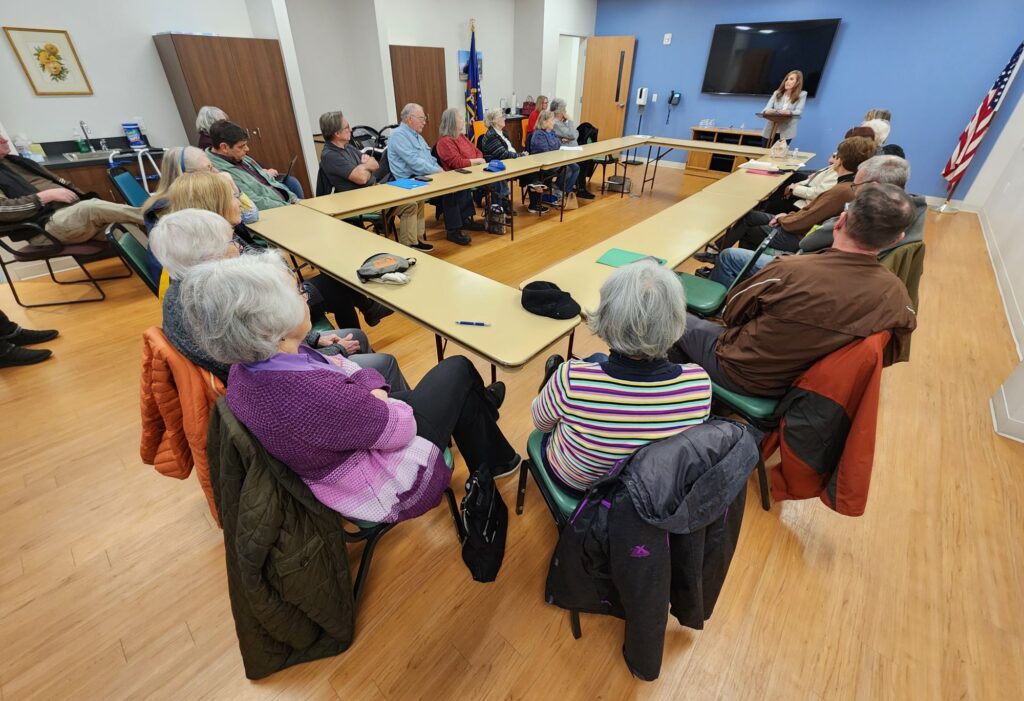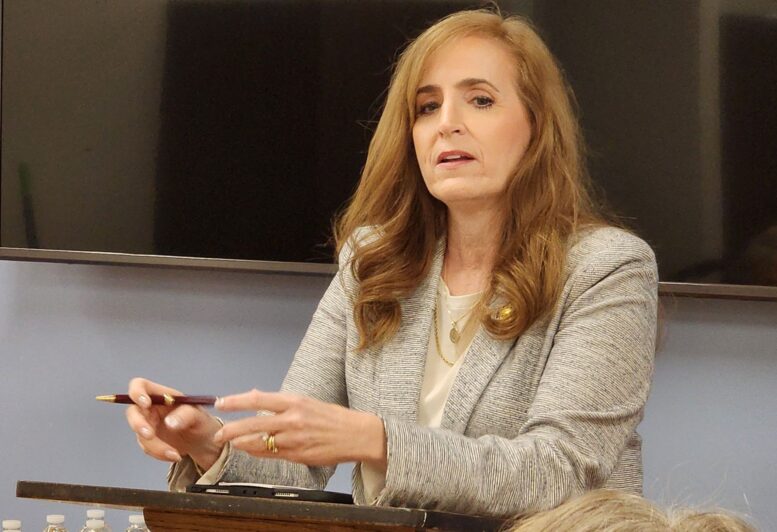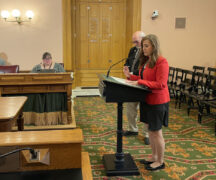By JAN McLAUGHLIN
BG Independent News
On the heels of overriding the governor’s veto of House Bill 68, State Sen. Theresa Gavarone took a victory lap at a meeting of the Bowling Green Republican Club. But in her celebratory lap, she encountered a few bumps in the road Thursday evening.
Gavarone described the bill she co-sponsored as a measure to protect Ohio’s children from transgender care.
“It was vitally important to override that veto,” Gavarone, R-Bowling Green, said. “We need to protect kids.”
But not everyone in the audience viewed it that way.
Some see it as harming trans youth, some as usurping the rights of parents and doctors, and some as big government sticking its nose in where it doesn’t belong.
“I don’t understand this party anymore,” said Eric Bucks, of Bowling Green. “I don’t think I belong here anymore.”
Bucks said he’s not interested in co-parenting with state legislators.
“How come we have to meddle in everyone’s home life?”
But Gavarone said the bill banning gender-affirming care for trans youth is for their own good. While most parents try to do what’s best for their children, there are times the government must step in.
“The government protects children from a whole lot of things,” Gavarone said. “You can’t give your child heroin.”
“Come on, Theresa,” Bucks said, objecting to the comparison. “We’re talking about taking your child to health care.”
HB 68 will prohibit gender-affirming care for trans youth, including hormone therapy and puberty blockers. The bill will also prevent transgender athletes from playing women’s sports.
Gender-affirming care includes a range of social, psychological, behavioral and medical interventions “designed to support and affirm an individual’s gender identity” when it conflicts with the gender a person was assigned at birth, according to the World Health Organization.
Gender-affirming care generally consists of four general practices: social affirmation, puberty blockers, hormone therapy and gender-affirming surgeries, according to the U.S. Department of Health and Human Services’ Office of Population Affairs.

Wood County’s legislators – Gavarone and State Rep. Haraz Ghanbari, R-Perrysburg – both voted to override Gov. Mike DeWine’s veto.
Bowling Green Republican Gary Thompson asked Gavarone about DeWine’s motivation for vetoing the bill.
“Any idea what was in our governor’s mind?” Thompson said.
Gavarone said she believed DeWine had good intentions. “But good intentions don’t always equal good policy.”
DeWine released a statement following the veto override. “I continue to believe it is in the best interests of children for these medical decisions to be made by the child’s parents and not by the government,” his statement read.
Bowling Green resident Janet Parks agreed during Thursday’s meeting.
“It’s up to parents to make that decision, not politicians,” she said.
When he vetoed the bill, DeWine said the consequences of the bill would be severe.
“I believe this is about protecting human life,” DeWine said during a press conference. “These are gut-wrenching decisions that should be made by parents and should be informed by teams of doctors who are advising them.”
But Gavarone stuck by her belief that the bill is necessary to prevent “genital mutilation” and irreversible hormone therapy.
“Why can’t we just let kids be kids,” she said, arguing that the brains of juveniles aren’t fully mature and therefore should not be making “life-altering” decisions.
While she listened to the testimony from trangender youth, their parents and doctors, Gavarone was more swayed by the testimony of people who said they later regretted their early decisions to get gender-affirming treatment. Some of those decisions are irreversible, she said.
“When you’re an adult, make adult decisions,” Gavarone said, suggesting that youth should wait till adulthood to get gender-affirming care.
But some in the audience objected, saying any such care would be the decision of the parents and doctors. They also noted the documented mental health risks of restricting gender-affirming care for transgender youth.
Nearly one in five transgender young people attempted suicide in the past year, according to the Trevor Project 2023 national survey where more than 28,000 LBGTQ people ages 13 to 24 were surveyed.
A 2022 study published in JAMA Network Open showed that access to puberty blockers and gender-affirming hormone therapy improves mental health.
The survey found that access to hormones and puberty blockers for young people ages 13-20 was associated with a 60% lower odds of moderate to severe depression and a 73% lower odds of self-harm or suicidal thoughts compared to youths who didn’t get these medications.
Gender-affirming care is supported by every major medical organization in the United States. Children’s hospitals across Ohio, the Ohio Children’s Hospital Association, and the Ohio Academy of Family Physicians all oppose HB 68. No Ohio children’s hospital performs gender-affirming surgery on patients under 18 currently.
Puberty blockers use hormones to pause puberty development and are reversible.
Hormone therapy helps align a person’s body with their gender identity by giving testosterone hormones to those who were assigned female at birth and giving estrogen hormones to those who were assigned male at birth. This is partially reversible.
HB 68 also prevents transgender athletes from participating in school sanctioned sports. “Biological males,” who have far more strength, should not be competing against females in sports, Gavarone said. And they should not be replacing women on teams.
“That’s what we fought for in the ’70s. I remember it well,” she said.
It was not mentioned that the Ohio High School Athletic Association and National Collegiate Athletics Association already have policies in place handling transgender athletes.





